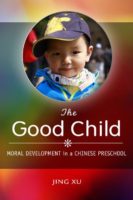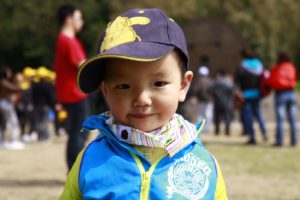Why don’t Chinese socializers want their children to be compassionate and altruistic, or, at least, not too much? Why don’t young children share things in an egalitarian fashion, despite being told to do so by teachers and parents? Do these singleton children take for granted that everything belongs to them, or do they learn to negotiate ownership disputes and establish fairness rules? Are these children self-centered “little emperors” or are they well-disciplined students? My book, The Good Child: Moral Development in a Chinese Preschool, examines these and other puzzling questions I encountered during my fieldwork in Shanghai, from 2011 to 2012.
The book is inspired by a larger theoretical adventure of bridging anthropology and psychology in understanding fundamental questions facing humanity: How do we become moral beings? How do culture and mind intersect in the emergence of morality? First, while the emerging anthropology of morality and ethics is saturating nearly all social contexts, how children learn and acquire morality in their early years is an understudied direction in this field. Past anthropological studies on children’s diverse socialization experiences, however informative they are, have yet to figure into today’s mainstream anthropological discourses on morality. Moreover, exciting new discoveries on the emergence of morality in early childhood have inspired debates across biological, psychological, and social sciences (one can get a glimpse of its significance, by surveying top journal publications or mainstream media coverage), but this line of research is confined to experimental methods on mostly “WEIRD” populations (Western, Educated, Industrial, Rich, Democratic), without attending to children’s everyday socio-moral experience.
Driven by this theoretical ambition, I was especially fascinated by the case of China, where the relationship between children and moral norms—a topic that has concerned a previous generation of sinological anthropologists—deserves new ethnographic research, as longstanding Chinese moral education traditions are complicated by profound social transformations in contemporary China. Chinese academic traditions take zuo ren—moral cultivation—as the ultimate goal of learning, and education is seen as a crucial element in the edification of a better society. However, there is a widespread perception that China is in the midst of moral decay. Furthermore, the new generation of singleton children in urban China have distinctive moral experiences, different from those of previous generations or in other cultures.
Through the case of a middle-class private preschool (ages 2–6) community in Shanghai, my book aims to answer this central question: how do Chinese children, born under the one-child policy, alternately seen as China’s greatest hope and derided as self-centered “little emperors,” navigate their social world and developing their moral senses, at the height of a widely perceived “moral crisis” in China?
A unique feature of this book is the creative combination of anthropological and psychological theories and methods. For example, integrating psychological experiments into ethnographic fieldwork, I discovered the tension between the ideology of egalitarian sharing promoted by educators and children’s practice of sharing for strategic favors; I then illustrated the joint influence of adults’ guanxi practices and children’s nascent psychological dispositions for mutualistic cooperation on such sharing behavior. My book further brings together fine-grained analysis of social interactions among children, educators, and caregivers; questionnaire survey on child-rearing beliefs and practices; and salient cultural discourses and moral events in the broader society. For example, in the broader context of “soul-searching” in contemporary China, such as the discussion of the death of toddler girl Xiao Yueyue, I explored how socialization processes tune and twist children’s nascent empathy, thus creating a tension between cultivating empathy in the familiar school environment and suppressing empathy in the “dangerous” real world.
My book demonstrates that parents and educators are caught up in profound quandaries in moral education, as they live with extraordinary aspirations of children’s future success in an increasingly competitive environment, and tremendous anxieties about raising a moral child—their “only hope.” The heightened tension between cultivating morality and securing future success, and the proliferation of negotiating contradictory moral visions and childrearing values, doubtlessly, have profound impacts on child development, and will ultimately shape the future of China.
Moreover, it places young children at the center of analysis; reveals how cultural experience and psychological mechanisms together shape children’s moral development in multiple domains, including empathy and altruism, equality and strategic favor, fairness and ownership; and contextualizes such development in everyday socialization and disciplinary (guanjiao) practices. Although childhood is a prominent theme in the anthropology of China, the voices and experiences of young children themselves, especially those before elementary school age, are nonetheless obscured, for theoretical and methodological reasons I have alluded to. My book highlights children’s own agency and creativity: for example, I examined how some singleton children aptly updated their ownership heuristic from “everything is mine” to the first-possessor bias and strategically used ownership and fairness rules in navigate property disputes. In sum, they can proudly function as the center of universe at home, while also quickly adapting to the collective life at school and strive to become good students in teachers’ eyes. Thus my book presents how children construct their own moral universe that differs from both adult ideals (e.g., of returning to traditional “Chinese” values) and adult fantasies (of essentially selfish “little emperors”).
Ultimately, the story of one community speaks to fundamental issues facing all human societies: the concern for cultivating moral personhood, the tension between cooperation and competition, and the role of children as cultural learners and innovative agents. It is in this spirit that I wrote the book, a story that connects anthropological inquiry to broad, interdisciplinary conversations on the emergence of morality, and an ethnography that focuses on young children—they are perhaps the least studied population in cultural anthropology, yet they are the future.
Jing Xu received her PhD in anthropology from Washington University in St. Louis and conducted postdoctoral research in developmental psychology at the University of Washington. Situated at the intersection of anthropology, psychology, and Chinese studies, her research examines morality, childhood, and cultural transmission in contemporary China and comparative contexts.



